Unravel the mystery of who penned the Book of Chronicles and discover a tale woven with ancient secrets and scholarly debates.
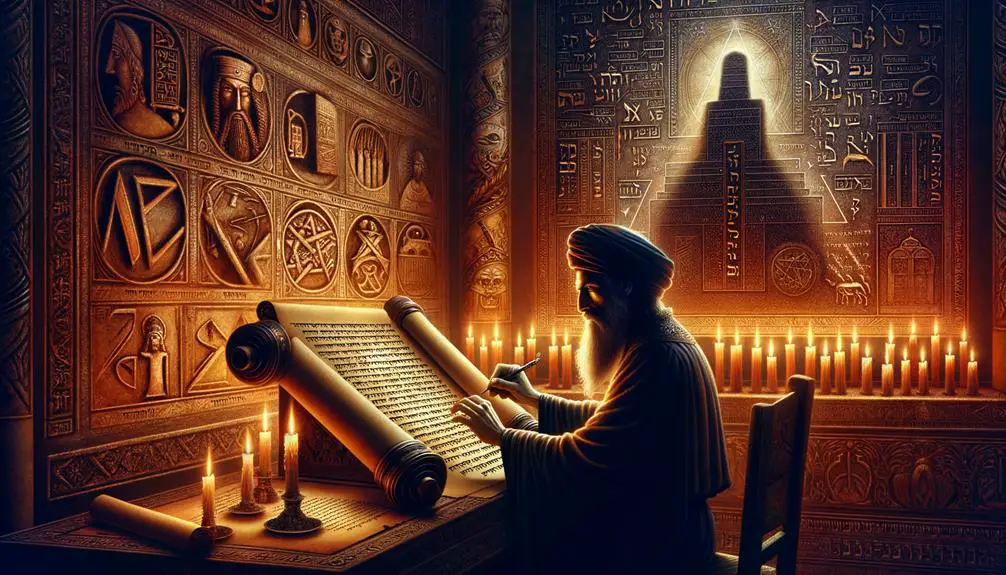
Who Wrote the Book of Chronicles in the Bible
Diving into the origins of the Book of Chronicles is like peeling an onion; with each layer, you uncover more complexity and intrigue.
Traditionally, you've heard that Ezra might have penned this historical account, but as you dig deeper, you'll find that the waters are much murkier than you initially thought.
Historical clues and scholarly debates paint a picture full of alternative theories and perspectives. By exploring these, you'll not only get a glimpse into the past but also understand the significant role the Chronicler's work plays in biblical history.
Why stop now when the next layer promises even more fascinating insights?
Key Takeaways
- Traditional attribution identifies Ezra as the author, supported by textual analysis and ancient tradition.
- Stylistic and linguistic similarities with Ezra's other works strengthen his authorship claim.
- Some scholars propose alternative theories, suggesting multiple scribes or a group effort in Chronicles' creation.
- The authorship debate remains vibrant, focusing on criteria like linguistic style, theological outlook, and historical context.
Traditional Attribution to Ezra
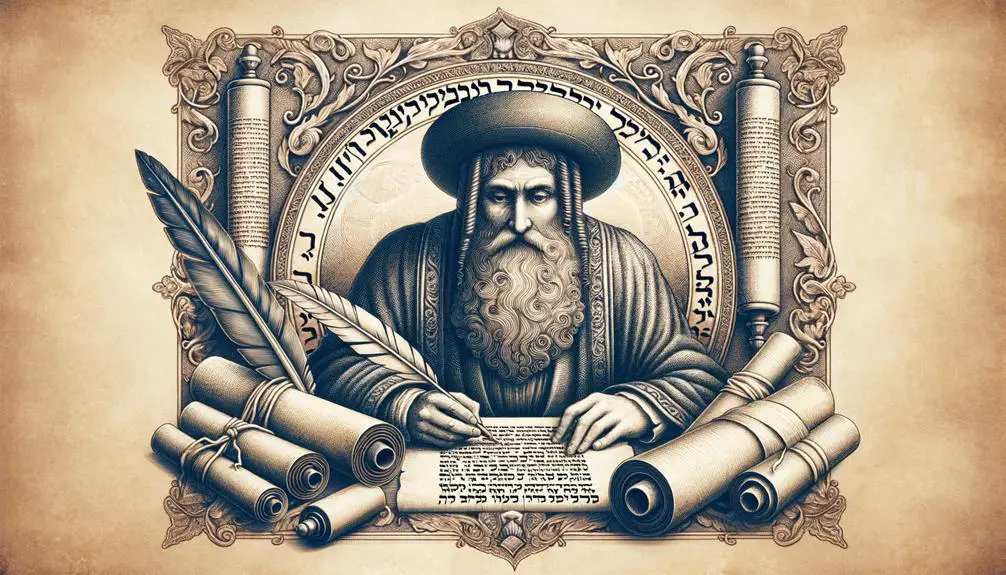
Historically, scholars have often attributed the Book of Chronicles to Ezra, grounding this assertion in a combination of textual analysis and ancient tradition. You'll find that Ezra's legacy, deeply entwined with scribe traditions, offers a compelling backdrop for this attribution. As a proficient scribe knowledgeable in the Law of Moses, Ezra's expertise positions him as a prime candidate for authorship. His role in leading the Jewish community during the Persian period and his dedication to the study and teaching of the scriptures further bolster this claim.
Digging deeper, the stylistic and linguistic parallels between the Book of Chronicles and other works attributed to Ezra, such as the Book of Ezra and Nehemiah, underscore the plausibility of this traditional view. These texts share a distinct focus on genealogy, temple worship, and the re-establishment of religious practices, reflecting Ezra's priorities and the scribe traditions he embodied. This thematic coherence suggests a common authorial hand, reinforcing the connection to Ezra.
Moreover, ancient rabbinic literature often credits Ezra with a pivotal role in the compilation and preservation of the Hebrew Scriptures. This tradition, while not definitive evidence, aligns with the scholarly consensus that views Ezra as not just a contributor but a custodian of Jewish textual traditions. Thus, the attribution of the Book of Chronicles to Ezra isn't merely a matter of historical conjecture but is deeply rooted in an understanding of his life's work and the scribe traditions that flourished under his guidance.
Historical Context and Clues
Diving into the historical context and clues, we uncover that the Book of Chronicles' composition period provides key insights into its authorship. You'll find that understanding the era in which this text was compiled is crucial. It was a time of reflection and consolidation for the Jewish community, post-exile, indicating a motive to both preserve and interpret their history through a lens that emphasized religious and moral lessons.
By engaging in source analysis, scholars have noted that Chronicles draws upon earlier texts, such as the books of Samuel and Kings, but with notable revisions and additions. These modifications serve not just as historical recounting but as a theological commentary, aimed at instructing the post-exilic community.
Chronological discrepancies within the text itself suggest that the author had access to various historical records and oral traditions, which they then meticulously wove together. Despite these discrepancies, the Chronicler's intent to provide a coherent narrative that supported the community's identity and beliefs is evident.
To evoke emotion and deeper understanding, consider these points:
- The meticulous source analysis undertaken reveals a profound respect for history and tradition.
- The chronological discrepancies highlight the complexity of historical narrative construction.
- The author's efforts to consolidate and interpret history underscore a deep commitment to community identity and moral education.
- The context of post-exilic reflection suggests a poignant yearning for understanding and continuity within the community.
This analysis not only sheds light on the possible authorship of Chronicles but also invites you to appreciate the depth and purpose behind its creation.
Debates and Scholarly Perspectives
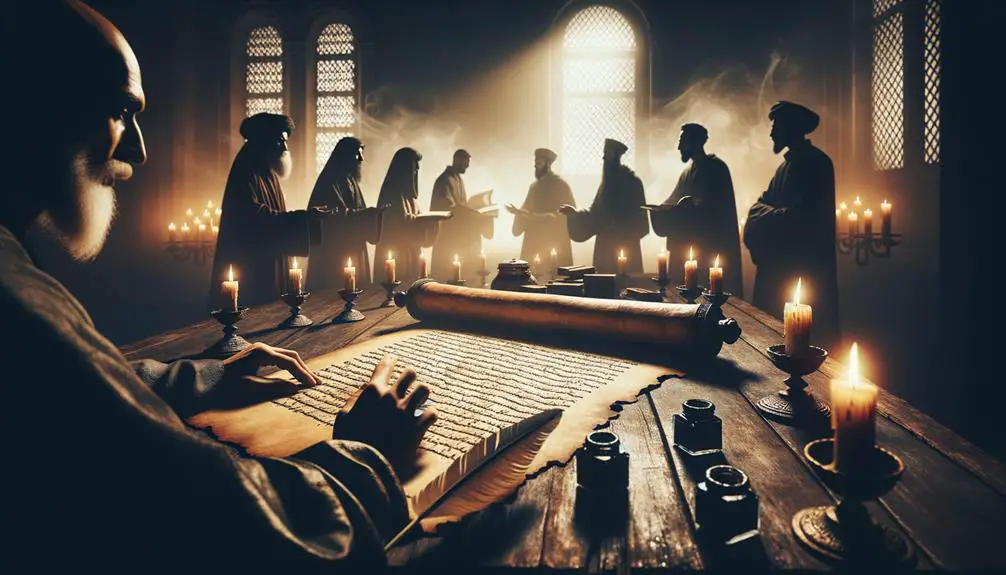
Exploring the scholarly debates surrounding the authorship of the Book of Chronicles reveals a rich tapestry of perspectives, each offering unique insights into its creation and purpose. You'll find that experts don't always agree on who penned this historical book, but they converge on a few critical authorship criteria, including linguistic style, theological outlook, and historical context. These criteria serve as the backbone of the ongoing discussions and analyses.
Diving deeper, you'll notice that textual variations between Chronicles and other books of the Hebrew Bible, such as Kings and Samuel, play a significant role in these debates. Scholars meticulously compare these texts to identify distinctive features that could hint at different authors or editorial stages. For instance, the way Chronicles omits certain details present in Kings or adds genealogical and ceremonial information not found elsewhere suggests a unique perspective and purpose, potentially pointing to a later date of composition.
This detailed scrutiny of textual variations has led to a consensus among many scholars that the author, often referred to as the Chronicler, likely lived during the post-exilic period. This timing is crucial because it affects how the author understood and interpreted the history of Israel, aiming perhaps to offer hope and a sense of identity to a community in reconstruction.
However, despite the wealth of analysis and the application of rigorous authorship criteria, the identity of the Chronicler remains elusive. While some suggest a single individual, possibly a Levite with access to royal archives, others argue for a group of scribes working over generations. This debate ensures the discussion about the Book of Chronicles remains vibrant and far from settled.
Alternative Theories Explored
Several alternative theories have emerged, challenging traditional views on the authorship of the Book of Chronicles by proposing innovative perspectives that scrutinize its origins and composition. These theories often emphasize the complexity of the text's creation, suggesting that our understanding of its authorship must go beyond simplistic attributions to a single figure.
- The notion of scribe anonymity posits that the Book of Chronicles could be the work of multiple anonymous scribes over centuries. This challenges the traditional attribution to a single author, instead suggesting a more communal and layered process of writing and editing.
- The compilation process theory argues that the Book of Chronicles wasn't penned in its entirety by a sole author but rather compiled from various sources. This perspective highlights the text's nature as a composite work, drawing from historical records, oral traditions, and earlier writings.
- Some scholars suggest that the Book of Chronicles was the result of a school or group of scribes working collaboratively. This collective effort would reflect a broader cultural and religious endeavor to preserve and interpret history.
- Another theory proposes that the Book of Chronicles was continuously updated by different generations of scribes. This iterative process of addition and revision could account for the text's distinctive style and thematic concerns.
These alternative theories invite you to reconsider the traditional views on the Book of Chronicles' authorship. They emphasize the complexity of its compilation process and the possible anonymity of its scribes, offering a richer and more nuanced understanding of its origins and significance.
The Role of Chronicler's Work
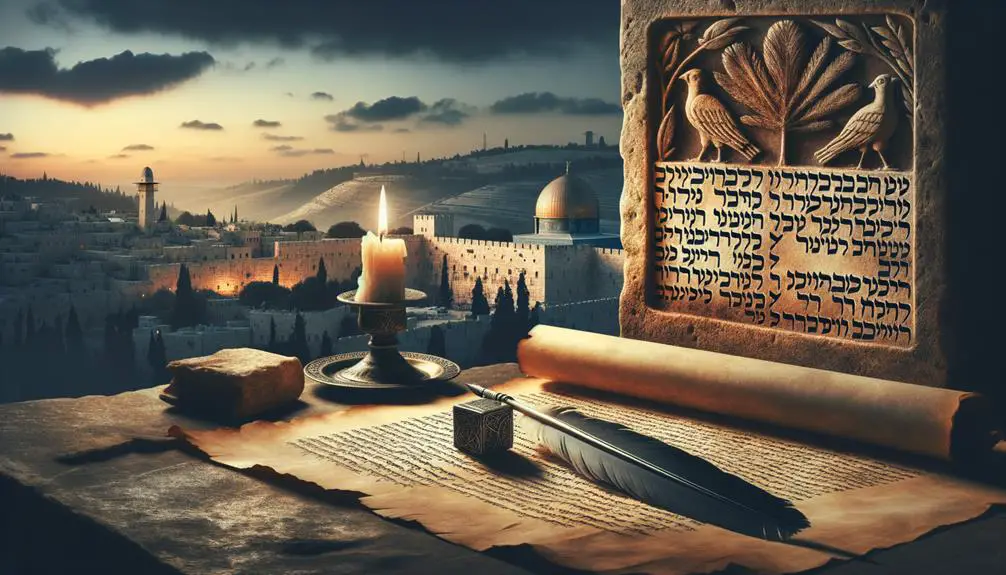
The Chronicler's work significantly shapes our understanding of Israelite history and identity, offering a distinctive perspective that merges religious, cultural, and political narratives. Through careful compilation and interpretation of temple records, the Chronicler not only recounts the past but also imbues it with theological significance, emphasizing the centrality of worship and the temple's role in community life.
You'll find that the Chronicler's meticulous attention to genealogies isn't merely for historical record-keeping. It serves a deeper, genealogical importance, reinforcing the notion of a chosen people and their unbroken connection to the land. This focus on lineage and heritage underlines a collective identity, reminding the community of their shared past and covenant with God.
Moreover, the Chronicler's use of temple records isn't just an archival endeavor but a deliberate act to legitimize the temple's religious authority and the priesthood. By carefully selecting and presenting these records, the Chronicler provides a theological rationale for the temple's practices and its central role in Israelite society, thus shaping the community's understanding of its relationship with God.
Through this lens, you'll see that the Chronicler's work is more than a historical account; it's a theological narrative aimed at instructing and guiding the post-exilic community. By intertwining genealogical importance with temple records, the Chronicler crafts a narrative that reaffirms the community's identity, promotes continuity with the past, and underscores the enduring significance of their covenantal relationship with God.
Frequently Asked Questions
How Does the Book of Chronicles Differ in Content and Focus From the Books of Kings, and What Implications Does This Have for Its Intended Audience or Purpose?
You'll notice the Book of Chronicles places a stronger genealogical emphasis compared to the Books of Kings, highlighting Israel's history from Adam to the Babylonian exile. This focus suggests a political motivation, aiming to reinforce Jewish identity and religious commitment among those returning from exile.
It's tailored for an audience seeking connection to their past, underlining the book's purpose to instruct and unite the post-exilic community around a shared heritage and faith.
What Specific Linguistic or Stylistic Features in the Book of Chronicles Suggest Its Post-Exilic Composition, and How Do These Features Compare to Other Contemporary Biblical Texts?
As they say, 'The devil's in the details,' and when you delve into Chronicles, its genealogical emphasis and unique narrative structure shout post-exilic origins.
Unlike earlier texts, Chronicles meticulously aligns genealogies with events, weaving a rich tapestry that connects past to present.
This stylistic choice, alongside a narrative that often parallels and diverges from other biblical texts, underscores its intent to redefine identity and history for a returning exile community.
How Have Modern Archaeological Discoveries Influenced Our Understanding of the Historical Accuracy of Events and Figures Mentioned in the Book of Chronicles?
Modern archaeological methods have significantly impacted your understanding of the Book of Chronicles. These discoveries have clarified many chronological debates, aligning or challenging the historical accuracy of events and figures mentioned.
As you delve deeper, you'll find that archaeological evidence provides a detailed, analytical lens, corroborating some narratives while questioning others. This authoritative approach reshapes your perception, offering a more nuanced view of the ancient text's reliability and historical context.
In What Ways Have Interpretations of the Book of Chronicles Evolved in Jewish and Christian Religious Traditions Over the Centuries?
As you delve into the evolution of interpretations of Chronicles, it's fascinating how textual transmission and comparative mythology have played pivotal roles.
Over centuries, Jewish and Christian traditions have uniquely molded their understandings, reflecting broader theological shifts.
Initially, Chronicles was a historical account, yet, through the lens of textual criticism and mythology studies, it's now seen as a complex narrative intertwining faith, history, and divine sovereignty, showcasing an intricate evolution of religious thought.
How Does the Portrayal of Temple Worship and Levitical Priesthood in the Book of Chronicles Contribute to Our Understanding of Religious Practices and Theological Concepts in the Second Temple Period?
The Book of Chronicles' depiction of temple worship and the Levitical priesthood sheds light on religious practices and theological concepts during the Second Temple period.
It emphasizes the grandeur of temple architecture and the significance of priestly garments, reflecting a deep reverence for ritual purity and divine worship.
This portrayal enriches your understanding of how these elements symbolized a closer connection to the divine, shaping the spiritual landscape of the time.
Conclusion
Navigating the authorship of the Book of Chronicles is akin to exploring a vast, ancient labyrinth, with every corridor offering new clues but no definitive exit.
While tradition has long pointed to Ezra as the master architect behind this biblical edifice, modern scholarship has unearthed a multitude of perspectives, suggesting a collaborative effort over centuries.
This complex construction, built on the pillars of history, theology, and literary art, stands as a testament to the enduring quest for understanding and interpretation.


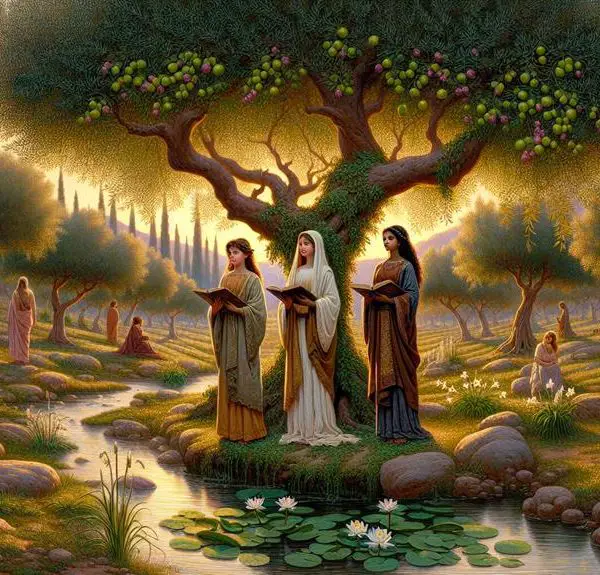
Sign up